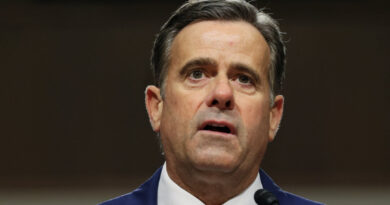Assessing Trump’s First Month in Office: A Poll of Epoch Readers
Upon his return to the White House for a second term, President Donald Trump has decisively pursued his agenda for America, as reflected in an Epoch Times poll that reveals significant public backing for his initiatives during the initial 30 days of his presidency.
From enforcing stricter immigration policies to dismantling diversity, equity, and inclusion (DEI) initiatives throughout the federal government, Trump has implemented major reforms via a series of executive orders that have profoundly reshaped federal policy. Some of these efforts have already shown positive results, including substantial reductions in government spending and a notable drop in illegal border crossings.
The Epoch Times survey, which gathered input from over 30,000 readers, reflects strong approval for Trump’s early measures, particularly concerning border security, countering transgender ideology in educational institutions, and the deployment of the Department of Government Efficiency (DOGE) to enhance federal operations and conserve taxpayer funds.
However, some proposals—such as abolishing the Federal Emergency Management Agency (FEMA), imposing tariffs on Canada and Mexico, and attempting to purchase Greenland from Denmark—encountered heightened resistance.
Topline Poll Results
In the initial 30 days, the Trump administration garnered a 92 percent approval rating, with 87 percent expressing strong support for its activities.
Disapproval was minimal at 8 percent, with only 7 percent voicing firm opposition.
Trump’s overall performance, as well as specific policy areas, received the strongest approval from respondents aged 55 to 64, where 90 percent indicated strong support and an additional 4 percent somewhat approved of the administration’s performance in its inaugural month.
The prevailing sentiment indicates robust approval for Trump’s first month as the 47th president, despite facing lawsuits contesting his actions and vigorous opposition from Democrats who accuse him of circumventing Congress. His staunchest critics have gone so far as to claim that his executive actions could lead to a constitutional crisis.

President Donald Trump delivers remarks in Palm Beach, Fla., on Feb. 18, 2025. Joe Raedle/Getty Images
Curbing Illegal Immigration
The administration’s initiatives aimed at enhancing border security have received the highest rates of approval.
An impressive 92 percent of respondents strongly back the government’s border security efforts, while an additional 3 percent express moderate approval. Only 4 percent disapprove, including 2 percent who somewhat disapprove.
Immigration and border control were among the top priorities for voters in the 2024 elections, closely followed by economic issues like inflation and affordability. Pre-election polls revealed significant public concern over the record-high illegal border crossings and inflation reaching 9 percent during former President Joe Biden’s tenure.
On his first day in office, Trump signed 10 executive orders and proclamations focused on border security and the deportation of undocumented immigrants. He ended the “catch and release” policy, terminated the CBP One app used for parole exceptions, and pressured Mexico—by threatening tariffs—to deploy 10,000 troops to combat drug trafficking and enhance immigration enforcement.
Strong support was also exhibited for the administration’s deportation strategies. Eighty-six percent expressed solid approval, while 8 percent somewhat supported the removal of individuals without legal status from the U.S. Only 5 percent disapproved.
Tom Homan, Trump’s appointed border czar, recently reported that Border Patrol apprehensions of illegal crossers fell below 300, a significant reduction from over 11,000 at the peak crisis point under the Biden administration.
“I began my career as a Border Patrol Agent in 1984, and I can’t recall the numbers ever being that low,” Homan stated on Feb. 17.

Illegal immigrants await takeoff for a removal flight at the Tucson International Airport, Ariz., on Jan. 23, 2025. Under the direction of U.S. Northern Command, U.S. Transportation Command is supporting Immigration and Customs Enforcement removal flights by providing military airlift. Dept. of Defense photo by Senior Airman Devlin Bishop
Transgender Ideology and DEI
Trump’s initiatives aimed at addressing transgender ideology in K–12 education have received resounding approval, with 94 percent in favor and only 5 percent opposing, while neutral opinions were negligible.
Trump’s efforts to eradicate DEI programs have similarly found strong support. Ninety percent of respondents expressed strong approval for dismantling DEI initiatives, with only 7 percent in disapproval.

People hold up signs during a rally against critical race theory (CRT) being taught in schools at the Loudoun County Government center in Leesburg, Va., on June 12, 2021. Andrew Caballero-Reynolds/AFP via Getty Images
Foreign Aid, USAID, and WHO
Trump’s intention to restructure the U.S. Agency for International Development (USAID) and pause foreign aid has garnered considerable approval.
Moreover, Trump’s directives to withdraw from the World Health Organization (WHO) and the Paris Climate Accord have received considerable backing. Eighty-five percent strongly approve, while 5 percent somewhat support the moves. Disapproval stood at 8 percent.
Trump asserted that the climate accord imposed unjust restrictions on the United States while allowing other countries to proceed unchecked despite their high emissions. His administration projected that withdrawing from the accord could save the U.S. $1 trillion.

The lobby of the U.S. Agency for International Development (USAID) headquarters in Washington on Feb. 3, 2025. Kevin Dietsch/Getty Images
Government Downsizing and DOGE
Under the leadership of tech entrepreneur Elon Musk, DOGE has been vital to Trump’s goals of curtailing federal expenditures and minimizing governmental waste.
A significant 88 percent of respondents expressed strong support for DOGE’s initiatives, with 4 percent somewhat approving. Disapproval remained low at 7 percent.
Trump stated that DOGE has already uncovered “billions and billions of dollars in waste, fraud, and abuse,” while Musk emphasized that reducing federal expenditures is “critical for America to maintain its solvency.”
Among DOGE’s cost-saving initiatives is the termination of government-paid media subscriptions to outlets like The New York Times and Politico; this move received 92 percent approval, while only 4 percent opposed.

The U.S. Department of Education building in Washington on July 6, 2023. Madalina Vasiliu/The Epoch Times
Energy, Environment
Trump’s commitment to increasing domestic energy production has received widespread endorsement.
Ninety-two percent either approve or strongly approve of Trump’s various initiatives to expand domestic energy output, particularly in oil and gas drilling, with just 6 percent disapproving.
Support for rolling back subsidies for electric vehicles and renewable energy initiatives stood at 76 percent, with 12 percent somewhat approving. Six percent disapproved, while another 6 percent remained neutral.
Meanwhile, efforts to eliminate environmental regulations boasted 88 percent support, including 17 percent lukewarm endorsement. Disapproval was at 9 percent, indicating a somewhat more contentious perspective on environmental deregulation.

An oil pump jack in a field in Nolan, Texas, on June 28, 2024. Brandon Bell/Getty Images
China, Greenland, and More
Trump’s initial steps on the international front appear to have garnered robust support.
Trump’s firm approach towards China received overwhelming endorsement, with 83 percent strongly approving of measures taken to mitigate Beijing’s global influence, while 10 percent indicated some level of agreement. Just 3 percent expressed discontent.
In addition to imposing tariffs on China, Trump’s administration threatened to place 25 percent duties on imports from Canada and Mexico, although these have been suspended following agreements to enhance border security between the three nations.
Approval for the tariffs on China, Canada, and Mexico indicated strong support from 61 percent of Epoch Times readers, with 21 percent expressing lesser support. Overall disapproval was noted at 9 percent.
The president’s drive to renegotiate NATO funding and reassess U.S. aid to Ukraine has received active approval, with 90 percent expressing support and just 8 percent opposing.
Trump has criticized NATO allies for failing to meet their 2 percent defense spending commitments, proposing a higher 5 percent target instead. He has also vowed to resolve the conflict in Ukraine, insisting that European nations should bear more financial responsibility for assisting Kyiv against Russia’s invasion and for security guarantees once a peace accord is ultimately reached.
Another one of Trump’s initiatives is a potential reclaiming of the Panama Canal, which received some ambivalence among participants, with 84 percent approving, 8 percent disapproving, and 8 percent remaining neutral.
The least favored foreign policy proposal was Trump’s suggestion to purchase Greenland, which attracted only 34 percent strong approval, with an additional 28 percent indicating mild approval. Twenty-five percent remained neutral and 13 percent expressed disapproval, making it the most divisive suggestion in the survey.

Shipping containers are organized at the Houston Port of Authority in Houston on Feb. 10, 2025. Brandon Bell/Getty Images
Write-In Responses
The write-in responses prominently highlighted priorities including government spending cuts and debt reduction, along with border security, tax reform, and federal government reforms.
A considerable number of respondents called for aggressive reductions in spending, a balanced budget, and diminished government involvement in economic matters. Many advocated for the elimination of specific federal agencies, reflecting widespread frustration with governmental inefficiencies.
Border security and immigration enforcement were identified as the second most frequently cited issues, with strong demands for mass deportations, stricter asylum policies, and an end to sanctuary cities.
Tax reform emerged as another significant issue, with preferences for lower taxes and a simplified tax code. Many also called for the complete elimination or significant restructuring of the Internal Revenue Service (IRS).
Concerns regarding inflation, economic growth, and job creation were prevalent, with respondents expressing strong support for deregulatory measures and pro-business policies. Social Security, healthcare costs, and governmental fraud were also heavily mentioned, as were demands for greater accountability and legal repercussions.
Election integrity remained a critical topic, with calls for stricter voter ID requirements and audits. Respondents frequently emphasized the need for energy independence, a robust military, and a firmer stance on China. Additionally, many advocated for term limits and judicial independence.
The overall sentiment conveyed a strong desire for substantial cuts in spending, enhanced border security, lower taxes, reduced bureaucracy, and stronger economic growth paired with increased government accountability.



